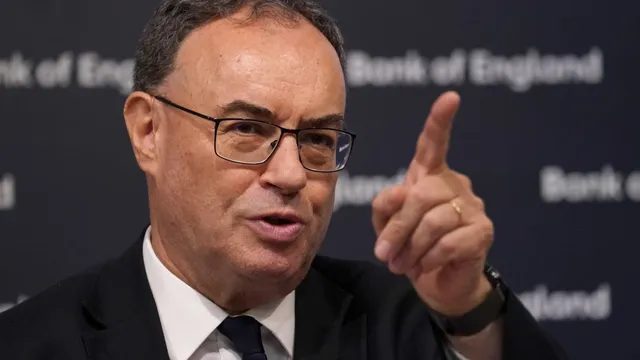
Bank of England to Discuss Future Rate Cuts
2024-08-23 15:55- Governor Andrew Bailey of the Bank of England will discuss the potential need for future rate cuts.
- Bailey emphasizes the importance of maintaining a steady course in response to labor market shocks.
- The central bank is considering the implications of easing off current restrictions over time.
Express your sentiment!
Insights
Bank of England Governor Andrew Bailey is set to address the progress made in reducing inflation in the U.K. during a speech at the U.S. Federal Reserve's symposium in Jackson Hole, Wyoming. He will highlight that headline inflation has significantly decreased, largely due to falling energy and food prices, and that higher interest rates have mitigated second-round effects like wage growth. However, Bailey will emphasize the need for continued caution, suggesting that monetary policy may need to remain restrictive longer than anticipated due to potential shocks in the labor market. Bailey will express a cautiously optimistic view, noting that risks to persistent inflation have diminished compared to a year ago. He will indicate that he currently favors a scenario where inflation persistence is self-correcting, allowing for a gradual easing of restrictions. Nonetheless, he will warn of two less favorable scenarios that could necessitate prolonged restrictions, hinting at structural changes in the economy stemming from recent shocks. Despite the positive signs, inflation in the services sector remains above 5%, and the Bank of England recently cut interest rates for the first time in four years. Markets are anticipating further cuts, with a 50 basis point reduction expected later this year. Bailey will stress that while progress has been made, the job is not yet complete, and the central bank must remain vigilant until inflation is sustainably back to the 2% target. In contrast, Federal Reserve Chair Jerome Powell has indicated that the U.S. central bank may soon adjust its policy, hinting at potential interest rate cuts in September. The differing approaches of the two central banks reflect their unique economic challenges, with Bailey advocating for a steady course in the U.K. as it navigates its recovery from a brief recession earlier this year.
Contexts
On August 1, 2024, the Bank of England made a significant decision to lower interest rates for the first time in over four years, aiming to address concerns about inflation driven by rising wages. This move was seen as a response to economic challenges in the job market, with the central bank emphasizing the ongoing battle against inflation. Following the rate cut, UK banks began to lower mortgage rates to alleviate financial burdens on households, providing relief to borrowers and signaling a shift in the economic landscape for homeowners. The housing market reacted positively to the interest rate cut, as the average cost of a home surged to £291,268 in July, reflecting the energizing effect on the market. In the aftermath of the rate cut, European markets experienced a significant decline, influenced by the Bank of England's decision and U.S. economic data. Moving forward to August 8, 2024, the Bank of England considered further interest rate cuts as employment figures weakened, indicating a response to ongoing economic challenges. The central bank's contemplation of rate cuts sparked debates within the monetary policy committee, with differing opinions on the impact of dwindling wage growth on interest rates. Fast forward to August 13, 2024, inflation climbed above the Bank of England's target, reaching 2.2%, while wage growth showed a slump, possibly signaling a slowdown in the British labor market. This development raised concerns about the need for further interest rate cuts to combat inflation. On August 16, 2024, Alan Taylor, a renowned professor at Columbia University, was set to join the Bank of England's Monetary Policy Committee, bringing his expertise to the committee following his appointment by the UK government. The addition of Taylor to the committee was expected to influence future rate decisions. Looking at August 19, 2024, the housing market experienced a surge in activity after the Bank of England's decision to cut interest rates, providing a late summer boost. UK banks sought savers' help to repay £100bn in Covid loans, potentially offering incentives to attract deposits and stabilize their finances post-pandemic. On August 20, 2024, housebuilders saw a surge in demand as the Bank of England cut interest rates for the first time in four years, leading to a 1.9% increase in stock prices according to Rightmove's figures. Finally, on August 21, 2024, Taylor Swift's tour in the UK generated increased restaurant bookings, showcasing the positive impact of the entertainment industry on the economy, despite analysts predicting no influence on the Bank of England's rate decisions.